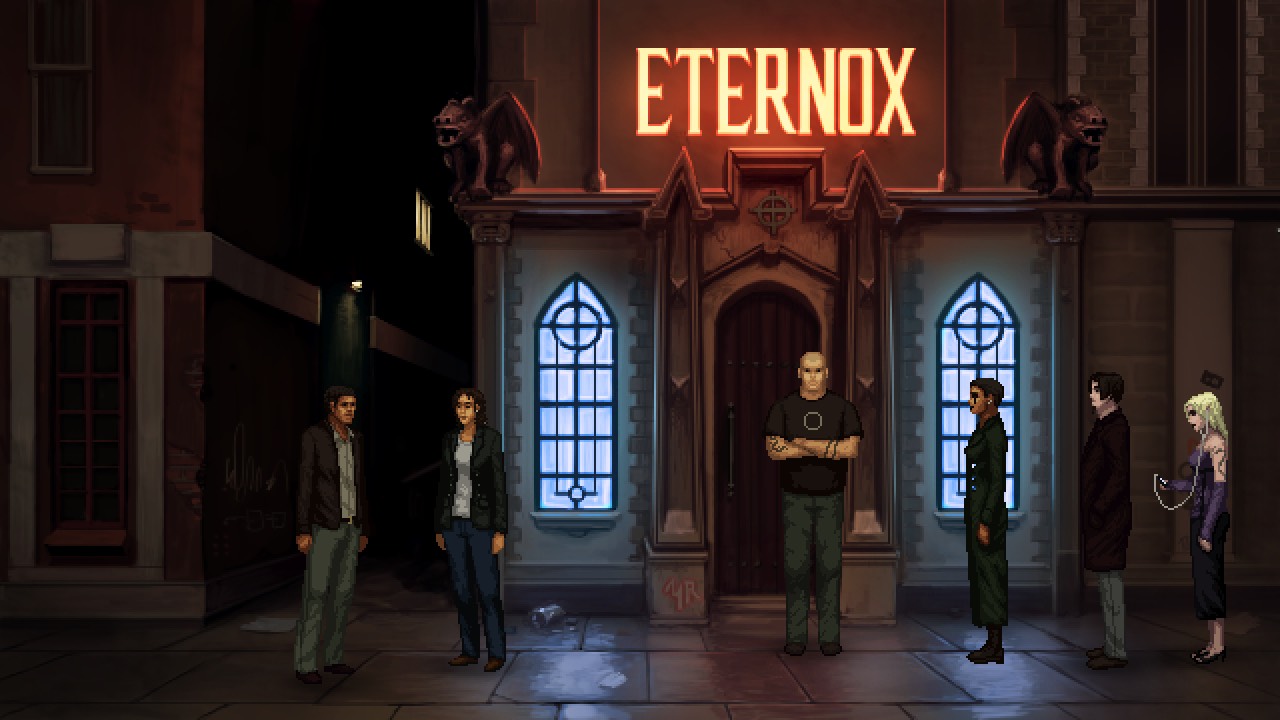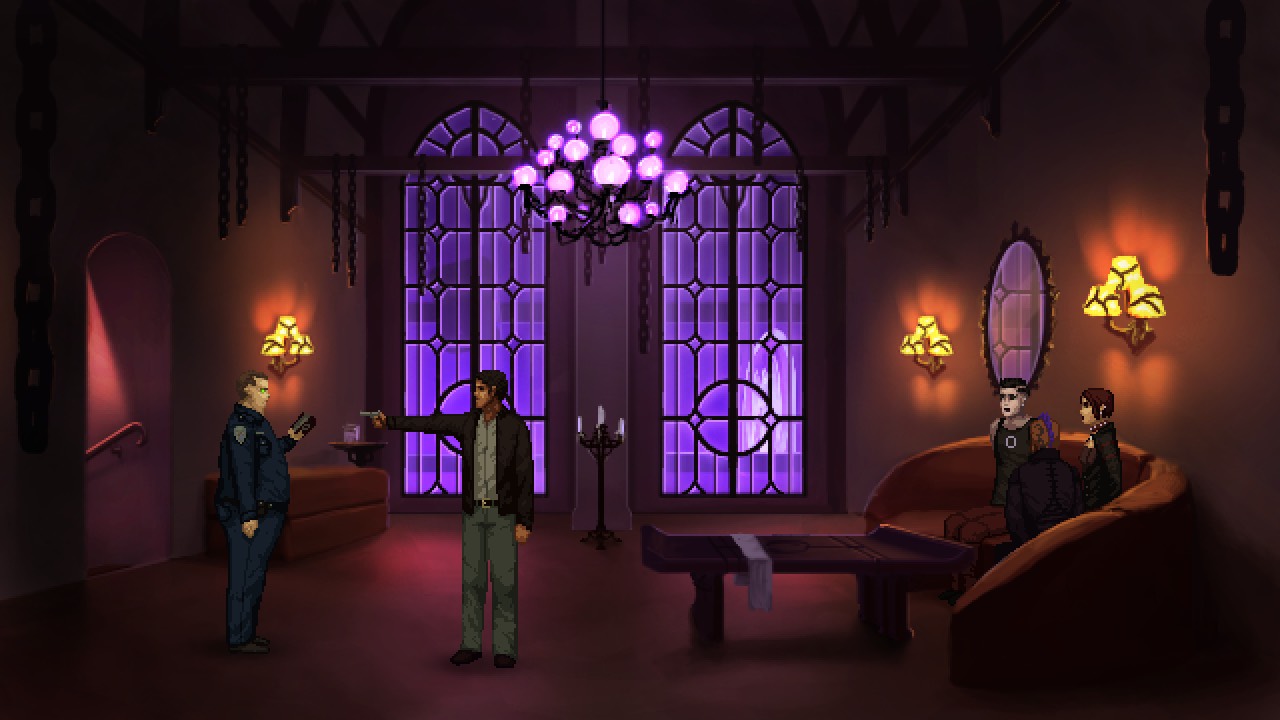When you find yourself binge-playing a video game like you would binge-watch a show on Netflix, that’s a very good sign.
In Unavowed, you have recently been freed from demonic possession by the Unavowed, a secret agency dedicated to saving the world from supernatural threats. Joining them on their mission, you must discover why supernatural activity has recently increased in New York City and how it’s connected to the demon that possessed you.
Rather than telling one huge story, Unavowed uses a much more episodic approach. It’s easy to imagine this as an excellent police procedural-type TV show. Every night, you are sent out on a different case to solve a supernatural mystery, saving the people of New York City from forces they are neither aware of nor understand. The threads of all these cases come together over time to create an engaging, overarching narrative with lots of fantastic plot twists along the way.
The high quality of the story is complemented by the incredible characters that populate this game’s world. These are some of the most well-rounded and developed NPCs I’ve ever seen in an adventure game. You get to see them struggle with addiction, loss, heartbreak, and loneliness: confronting their figurative demons alongside the literal ones.
The party system in Unavowed is a familiar RPG mechanic which adds to the cast’s characterization. You may choose two party members for every case, eventually selecting from a total of four. Each character has their own skills, abilities, and insights that allow you to advance the case in different ways. For example, if you have spirit-medium Logan in your party, you can communicate with ghosts to learn valuable information. If you have Mandana, a half-Jinn, in your party, you can accomplish superhuman feats of strength to overcome obstacles. This system dramatically expands the replay value far beyond that of most adventure games, as you can play each case with different characters and find alternative solutions.

Like in BioWare RPGs, you can debrief after a case with other Unavowed members back at HQ, asking their thoughts about the outcome of a case or questions about their personal history. In the field, the other two characters in your party will often have unprompted conversations about the current location, the case, or their personal lives. These exchanges give you an even deeper insight into the backstories of your fellow Unavowed members, further investing you in their struggles.
Your player character may lack a “voice,” but they still have wants, needs, desires, and frustrations. Right from the start, you choose your name, gender, profession, and backstory. These choices lead to one of three completely different prologue chapters that show the circumstances of your possession, further adding to the replay value of the game. Giving you a plethora of choices surrounding your character right away enhances the roleplaying elements in a way rarely seen in adventure games.
Dying in Unavowed is a pleasure (so to speak). Rather than forcing you to load an old save, the game immediately resets to just before you made the ill-fated choice that led to your demise. This is an improvement over the old Sierra style of handling death in adventure games. You still face the consequences of your choices, but without bringing the game’s momentum to a screeching halt.
Things are rarely black and white in this supernatural take on New York City, and you will often face moral dilemmas that feel impossible to resolve. You must regularly choose between the lesser of two evils, with consequences that matter later in the game. Meaningful decisions are something rarely found in adventure game stories, and it’s a testament to the quality of Unavowed’s writing that they are incorporated so effortlessly here.
Unavowed has an inventory system, just like any other adventure game, even though the puzzles aren’t usually inventory based. This avoids the old rub-one-object-against-another method of puzzle solving, but unfortunately takes much of the challenge out of the game. Most often, you simply need to show a character an item to progress; not exactly a mindbender of a puzzle. Outside of its point-and-click adventure trappings, Unavowed can feel much more like a visual novel. The game provides you with a text description of any item your cursor is hovering over and, rather than use a verb wheel, all actions are done with a single click. It’s a streamlined interface that can make the game feel a bit too simple in terms of its mechanics.
The game’s graphics are fantastic, with absolutely top-notch pixel art. From the city vistas to the well-designed characters, Unavowed evokes the look of classic adventure games, but with a modern touch. That said, there are a few strange animation issues present. The mouths of sprites don’t move while they are talking (though the beautiful character portraits mitigate this), and some character animations are less than smooth. On the whole, it’s a stunning (and surprisingly gory!) game with some fabulous art and character design.

The music in Unavowed is equally great. The noir-esque soundtrack complements the atmosphere perfectly without being distracting. Unfortunately, you cannot say the same for the rest of the sound design. I understand that Wadjet Eye Games may not have been able to afford a professional recording studio, but the audio quality of the voice acting negatively impacts the overall presentation of the game. Dialogue volume levels are all over the place, resulting in characters sounding like they are in separate rooms while in conversation with each other. This is especially heartbreaking, as the quality of the voice acting is quite high. There isn’t a bad performance in this game, just bad microphones. The worst example is Eli, the Fire Mage and conscience of the Unavowed. The actor did a fantastic job, but every single one of his Ps, Ts, and Bs loudly popped in my speakers.
Although I felt that the adventure game mechanics of Unavowed were slightly lacking, those criticisms pale in comparison to the overall quality of the storytelling. At times funny, tragic, heartfelt, silly, and even scary, this is one of the strongest video game narratives in recent memory. With impressive pixel art, wonderful (if poorly recorded) voice acting, and a plethora of choices that matter, Unavowed pushes boundaries in the adventure genre. I can’t wait to see what Wadjet Eye has up their sleeves next!


